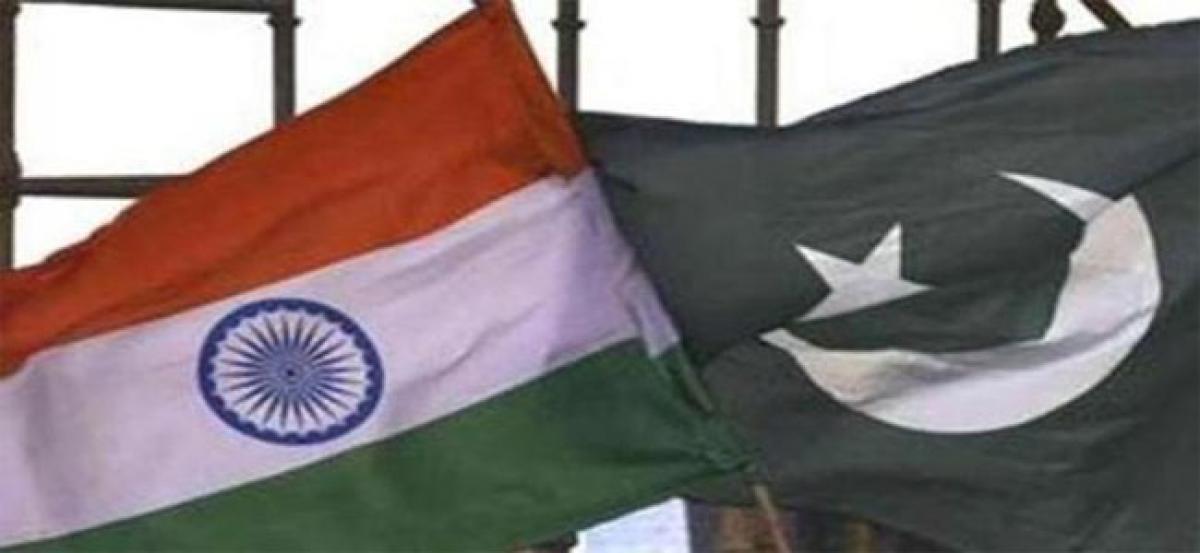Live
- GMR Airports Unveils AI-Powered Digital Twin Platform to Transform Airport Operations
- India poised to become leading maritime player: PM Modi
- Top Causes of Kidney Stones and How to Recognize Silent Symptoms
- India’s renewable energy capacity logs 14.2 pc growth at 213.7 GW
- Winter Session of Odisha Assembly adjourned sine die
- Biden calls Trump's tariff approach 'major mistake'
- After Drama Over Eknath Shinde’s Chief Minister Race, Maharashtra Cabinet Formation Faces New Tensions
- Egyptian FM, Blinken discuss recent developments in Syria
- Iran's supreme leader says Syria's developments result of US-Israeli 'plot'
- Elon Musk to Purchase $100 Million Luxury Mansion Next to Donald Trump's Mar-a-Lago, Report Reveals
Just In

A Pakistani delegation raised the issue of India’s alleged violation of the Indus Waters Treaty with the World Bank which discussed opportunities within the treaty to seek an amicable resolution, officials said on Tuesday.
World Bank meeting took place days after Prime Minister Narendra Modi inaugurated the 330 MW Kishanganga hydroelectric project in Jammu and Kashmir amid protests from Pakistan which claims that the project on a river flowing into Pakistan will disrupt water supplies.
A Pakistani delegation raised the issue of India’s alleged violation of the Indus Waters Treaty with the World Bank which discussed opportunities within the treaty to seek an amicable resolution, officials said on Tuesday.
Monday’s meeting took place days after Prime Minister Narendra Modi inaugurated the 330 MW Kishanganga hydroelectric project in Jammu and Kashmir, amid protests from Pakistan which claims that the project on a river flowing into Pakistan will disrupt water supplies.
Pakistan’s Foreign Office had, on Friday, voiced concern over the inauguration of the hydroelectric project, saying inauguration without resolution of dispute between the two countries will tantamount to violation of the Indus Waters 1960 that regulates the use of waters in the shared rivers.
“The Indus Waters Treaty is a profoundly important international agreement that provides an essential cooperative framework for India and Pakistan to address current and future challenges of effective water management to meet human needs and achieve development goals,” a World Bank spokesperson told PTI.
“The meetings are discussing concerns raised by the Pakistan delegation and opportunities within the treaty to seek an amicable resolution,” the spokesperson said.
No other details about the nature of Pakistani grievances were made available by the World Bank officials.
The discussions are scheduled to continue today.
The Pakistani delegation is led by Attorney General, Ashtar Ausaf Ali.
Islamabad had been raising objections over the design of the hydel project, saying it is not in line with the criteria laid down under the Indus Waters Treaty (IWT) between the two countries. But, India says the project design was well within parameters of the treaty.
The project, located at Bandipore in North Kashmir, envisages diversion of water of Kishan Ganga river to underground power house through a 23.25-km-long head race tunnel to generate 1713 million units per annum.
The Kishanganga project was started in 2007 but on May 17, 2010, Pakistan moved for international arbitration against India under the provisions of the Indus Waters Treaty.
The Hague-based International Court of Arbitration allowed India in 2013 to go ahead with construction of the project in North Kashmir and upheld Indias right under the bilateral Indus Waters Treaty to divert waters from the Kishanganga for power generation in Jammu and Kashmir. The international court, however, decided that India shall release a minimum flow of nine cubic metres per second into the Kishanganga river (known as Neelam in Pakistan) at all times to maintain environmental flows.
Pakistan is building a 969 MW Neelum-Jhelum hydroelectric project downstream.
The Pak Foreign Office in a statement in Islamabad last week said it was seriously concerned about the inauguration of the hydroelectric project.
“Pakistan believes that the inauguration of the project without the resolution of the dispute is tantamount to violation of the Indus Waters Treaty (IWT),” it said.
“Pakistan reiterates that as the custodian of the Treaty, World Bank must urge India to address to Pakistan’s reservations on Kishenganga Hydroelectric Project (KHEP),” the statement said.

© 2024 Hyderabad Media House Limited/The Hans India. All rights reserved. Powered by hocalwire.com







